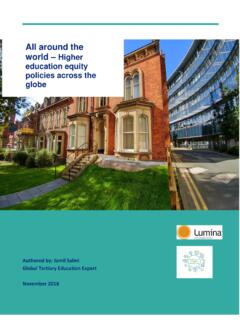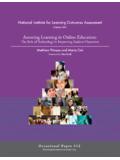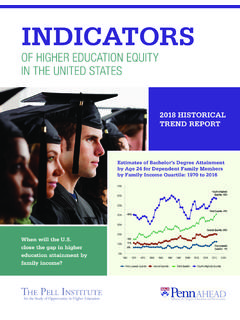Transcription of AFRICAN TRADITIONAL RELIGION: A CONCEPTUAL AND ...
1 LUMINA, Vol. 22, , ISSN 2094-1188. 1. AFRICAN TRADITIONAL religion : A CONCEPTUAL AND philosophical . ANALYSIS. Rev. Emeka C. Ekeke University of Calabar Nigeria Abstract There has been a divergent view regarding the concept and philosophy of AFRICAN TRADITIONAL religion . Some have seen Africans as not having the capacity to reason on the concept or the philosophy of God. This led them into giving all forms of derogatory names to AFRICAN TRADITIONAL religion . This paper examines the concept and philosophy of AFRICAN TRADITIONAL religion from the viewpoint of Africans. It presents the worldview, philosophical nature and foundation of AFRICAN TRADITIONAL religion .
2 It also shows that the worship of God in AFRICAN TRADITIONAL religion is through sacrifices, offerings, singing, dancing and prayers. The paper also considers the concept of evil, ethics, justice and time in AFRICAN TRADITIONAL religion . It concludes that Africans knew God before the coming of the missionaries to Africa. (Key Words: TRADITIONAL religion ; philosophical ; belief; concept; God). INTRODUCTION. The fact that Africans are notoriously religious is no longer an issue for debate among scholars today. This is because various peoples of Africa own a religious system and a set of beliefs and practices which bind them together to their Ultimate.
3 This is why A. C. Leonard argues that The religion of these natives [Africans] is their existence and their existence is their religion . It supplies the principle on which their law is dispensed and morality adjudicated. The entire organization of their common life is so interwoven with it that they cannot get away from it. Like the Hindus they eat religiously, drink religiously and sing religiously. (1966: 429). This fact of the intertwining of religion and secularity in Africa has created a problem when trying to understand the thought and reasoning of Africans. This is why the process of establishing a well thought-out philosophy in Africa for Africa by Africans has taken a long time in becoming widely accepted, though so many AFRICAN Philosophers such as Mbiti, Onyewuenyi, Asouzu, Omoregbe, Wiredu and so many others are doing their best.
4 LUMINA, Vol. 22, , ISSN 2094-1188. 2. Philosophy has been defined etymologically as the love of wisdom. Ozumba explains that philosophy has been variously defined as the handmaid of clarification, as the search for the ultimate meaning of sentence, and it is also seen as consisting in critical thinking, reflection and analysis of concepts (2007: 71). Hosper adds that philosophy tries to give the analysis of the various concepts making sure that these concepts are used properly. As such philosophy can be seen as CONCEPTUAL analysis (1976: 1). Since there are no sacred books on which to base the study of AFRICAN TRADITIONAL religion except on the proverbs, folklores, oral tradition, ethics and morals of AFRICAN societies, we shall, in this study, critically analyze some major concepts of AFRICAN TRADITIONAL religion in order to establish how Africans reason about the world around them, especially in reference to their religion .
5 This paper shall concentrate on AFRICAN cosmology (world view), the philosophical nature and foundation of AFRICAN TRADITIONAL religion , the concept of time and the worship of God in AFRICAN TRADITIONAL religion . We shall finally analyze briefly the concept of evil, ethics and justice in AFRICAN TRADITIONAL religion . AFRICAN COSMOLOGY (WORLDVIEW). Etim, E. Okon has seen cosmology as the sum total of people s opinion concerning life, happiness, fears, purpose of life, death and after-life. It is the fundamental commonalities of a given culture such as folkways, mores, language, human productions and social structure (2006: 4) Emefie Ikenga-Metuh in Okon describes a people s worldview as the complex of their beliefs and attitudes concerning the origin, nature, structure of the universe and the interaction of its beings with particular reference to man (2006: 4).
6 There are two major categories of worldview namely, the material worldview and the religious worldview. The material worldview sees the cosmos as a product of chance which has no meaning and has no end. For those who adopt this kind of world view, every occurrence, whether sickness or natural disaster is a product of chance. On the other hand, the religious worldview sees the cosmos as having a great meaning and purpose, therefore every happening is interpreted based on what the people perceive as its meaning or purpose. Redfield in his description of worldview adumbrates: Of all that is connoted culture , worldview attends especially to the way a man, in particular society sees himself to all else.
7 It is the properties of existence as distinguished from and related to the self. It is in short, a man s idea of the universe it is that organization of ideas that answers to a man with questions: Where LUMINA, Vol. 22, , ISSN 2094-1188. 3. am I? Among what do I move? What are my relations to these things? (1952: 31). From Redfield s explanation we can deduce that AFRICAN worldview is purely religious. This corroborates Shorter s view when he said Africans are notoriously religious (1978: 49). Since AFRICAN worldview is a religious one, it therefore means that religion and religious practices are their waking thought.
8 This is why their entire culture is permeated with religious practices. Mbiti has this to say about AFRICAN culture intertwining with religion . religion permeates into all the department of life so fully that it is not easy or possible always to isolate it. A study of these religious systems is therefore ultimately a study of the people themselves in all complexities of both TRADITIONAL and modern life religion is the strongest element in TRADITIONAL background, and exerts probably the greatest influence upon the thinking and living of the people concerned (1969: 1). In corroboration with Mbiti, Ezeanya agrees that in Africa life is religion , and religion is life (1980: 324).
9 This means that religion could not be explained away in Africa. Whoever tries it will be seen as a stranger to Africa. With the above issue of AFRICAN worldview in mind it becomes easier to understand the philosophy of AFRICAN TRADITIONAL religion . It is the philosophy that deals with how Africans see the world around them. It is a religious world where every life happenings are traceable to a particular spirit which must be appeased. Africans see the universe as created by the Supreme Being. This Being is the same as the Christian God and is known by various names in Africa. These names were adopted by Christians when translating the name of God into AFRICAN languages.
10 They do not agree with the chance perception of those whose worldview is materialistic nor do they agree with the big-bang-theory of the universe. This can be seen in various myths and creation stories in Africa. In some accounts according to Mbiti God made the heavenly part of the universe first, and then, standing on it, he created the earth (1975: 32). Some myths believe that God created the earth first, and then, standing on it, he created the heaven. Mbiti narrates that in some myths, the entire universe was created in one act (1975: 32). As regards the nature of the universe, many AFRICAN societies believe that the universe is made up of the visible (material) and the invisible (immaterial).








